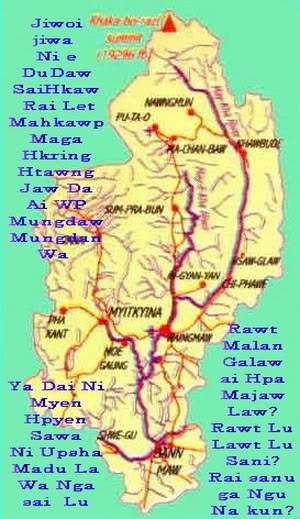KNG: What do you know about the ethnic people after your experiences to visit around the areas?
Rogers: I have made over 30 visits to Burma’s borderlands, including the Thailand-Burma border, India-Burma border, China-Burma border and Bangladesh-Burma border. I have visited Karen, Karenni, Shan, Chin and Kachin many times, and the Mon and Rohingya and Rakhine once. All of Burma’s ethnic peoples are suffering severe violations of human rights, which come as a result of the regime’s racist discrimination and persecution of non-Burman ethnic groups. In some parts, there is an active conflict resulting in the widespread displacement of people, military attacks on civilians, the destruction of villages, killings, and the use of human minesweepers. But even in areas, such as Chin State, where there is only a very low-level conflict, or Kachin State, where there is a ceasefire, human rights violations continue: forced labour, rape, religious persecution, forced relocation and the use of child soldiers. In addition, poverty is severe, especially in Chin State, as a result of the regime’s lack of investment in health and education.

Benedict Rogers and his newly published, Than Shwe-Unmasking Burma’s Tyrant. Photo: Kachin News Group
Can you tell me about the political, social, religious and economic situations of Kachin people?
The Kachin have a fragile ceasefire with the regime, but it is a ceasefire, not a meaningful peace. Despite the ceasefire, Kachins continue to face discrimination, and forced labour, rape, forced relocation and religious discrimination are widespread. In addition, the political situation is tense at the moment because of the KIO’s refusal to accept the regime’s order to become a Border Guard Force. Major social issues of drugs, environmental degradation and human trafficking are also causing suffering for the Kachin people, and these are caused, directly or indirectly, by the regime’s policies. Economically, Kachin State is being raped by China and by the regime, its natural resources exploited, and the people do not see any of the benefits from their natural resources.
How many time you have been visited in Kachin State and when did you visit there?
I have been three times – 2006, 2008 and 2009.
What do you see about the security of the ethnic Kachin people as such going on within the cease fire period?
The situation has become more fragile and vulnerable in recent years, and currently there is a risk that conflict could break out again.
Do you believe this election could bring some kind of step to change Burma?
No, it is simply a change of clothes, from military uniform to civilian suits. The constitutional provision for 25% of the seats for the military, a requirement for three-quarters majority for any amendment to the constitution, and the provision of immunity for the military for their crimes, combined with the unfair election laws which excluded political prisoners and meant the NLD led by Aung San Suu Kyi were unable to take part, and widespread rigging, intimidation and harassment during the election, all means that this election was a sham and represents no meaningful change.
What do you see the role of Aung San Suu Kyi in Burma political crisis?
Her role is crucial. She is the only Burman who currently commands widespread respect and affection among all the peoples of Burma, including ethnic nationalities. Her message of unity, dialogue and national reconciliation is very, very important. Her recent focus on the ethnic situation, and her support for the idea of a second Panglong conference, is very positive.
Do you think Burmese generals are the kind of negotiable?
I do not think they will be willing to negotiate unless they come under intense pressure to do so. They won’t do it by their own choice. However, if the right kind of international pressure, using diplomatic, political and economic means, is applied, and especially if the UN, supported by Burma’s neighbours China, India, Thailand, and members of ASEAN, use their influence to urge the regime to enter into dialogue, perhaps there is a chance.
What do you think the role of ethnic armed groups for its own people, are they really protected to the people or could give leadership to the people?
The armed groups exist to defend their own people from the Burma Army’s attacks, and – through their political wings – to provide political and social leadership to their people in their struggle for freedom. They are also often involved in community work.
According to you what is the best solution for political crisis in Burma?
I believe that what is needed is a meaningful tripartite dialogue between the regime, the democracy movement led by Aung San Suu Kyi, and genuine representatives of the ethnic nationalities, to secure the establishment of a federal democracy in which the rights of ethnic nationalities are respected and protected, and ethnic nationalities are given some autonomy within a federal democracy.







No comments:
Post a Comment